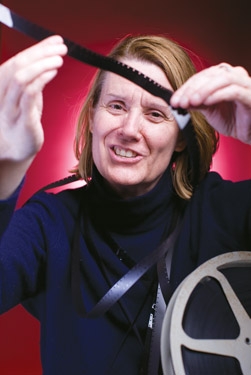Mendenhall gives students the world, one film at a time
Students who sign up for the course “How We See The World: Transnational Cinema” may think the title is self-explanatory. But as anyone who takes Julia Mendenhall’s Gen Ed Arts honors class will tell you, you’re learning more than the meaning of films — you’re learning about the world.
“The films were so eye opening... I was suddenly present in a world of interweaving connections, and had a much better understanding of my role in the world and a greater desire to be a more cosmopolitan citizen,” said Temple sophomore Samantha Rushford.
That’s just what Mendenhall had in mind when she created and first piloted the course in the Spring of 2009. By having students watch more than a dozen films produced around the world, she is showing them different cultures and giving them a better idea about their place in international society.
"We live in an interconnected world with a great diversity of visual images and stories," said Mendenhall, assistant professor in the Department of English. “So for me, as a scholar of film, I teach my students how to interpret films so that they can be world citizens. If they don't watch these films, they're denied this transcultural, global knowledge.”
While the films are one part of what makes the course so popular, the other is Mendenhall’s innovative teaching style, for which she has earned the Provost's Award for Innovative Teaching in Gen Ed. Combining the classroom with the city, the students visit theaters to get a better understanding of how international films make it to Philadelphia screens and enrich the city’s diverse film culture.
And just like any great film director who creates an environment that allows actors to explore, Mendenhall provides that same creative comfort: If you walk into her class, you walk into the middle of a discussion led by the students, and simply guided by Mendenhall.
"There’s a parallel between professors and film directors,” she said. “We encourage others to take creative risks to learn and act. Students don’t learn and really don’t learn to take action by sitting in the dark listening to a lecture. I ask them to think, question and to be independent, and then lead class discussions — and interpretations — of course films. Students love being trusted with guiding where the class will go intellectually. The innovating is in their hands, ultimately.”
Mendenhall’s approach is proving to have an impact with students like Samantha Wiggins.
"When I first signed up for Transnational Cinema, I thought the class would be boring, with a bunch of papers, but by then end of the semester I learned more than I thought I would,” said Wiggins. “Professor Mendenhall's style of teaching allowed the class to feel comfortable in voicing opinions.”
And students have even more opinions about the meaning of films after completing the Transnational Cinema course. Watching movies becomes a completely different experience, one that has them analyzing film elements — dialogue in many languages, cinematography and mis-en-scene, for example — more globally. They may not be cosmopolitan yet, but they are getting there — one film at a time.
